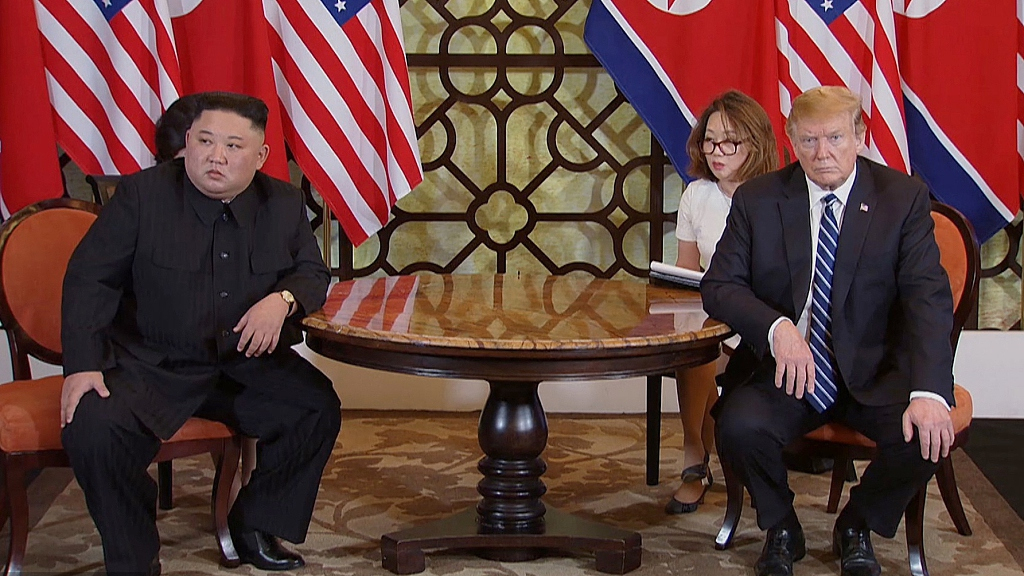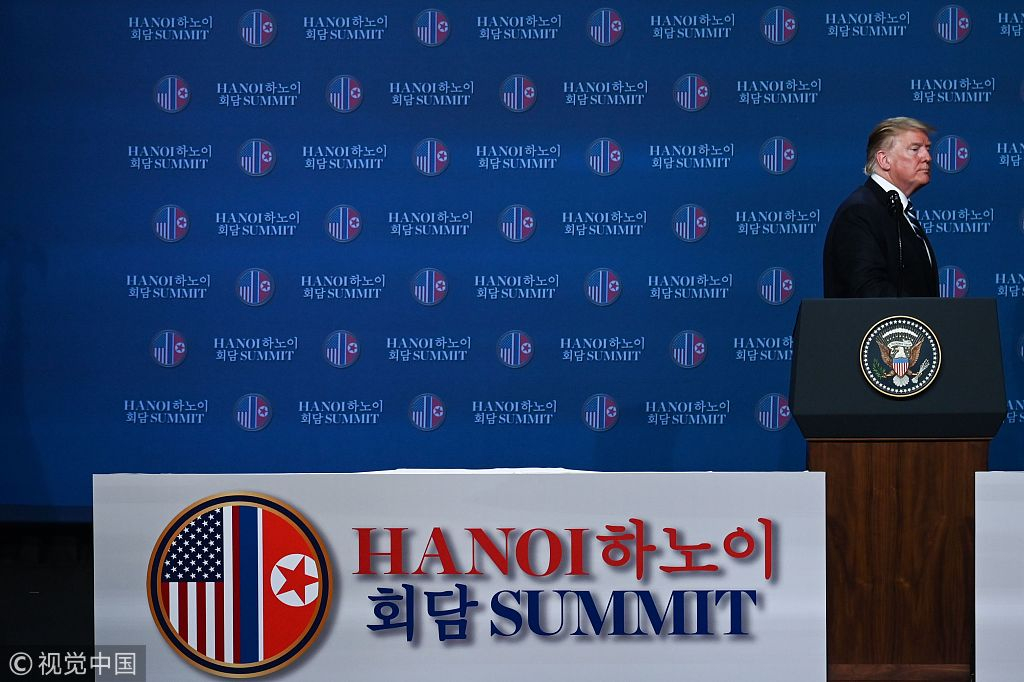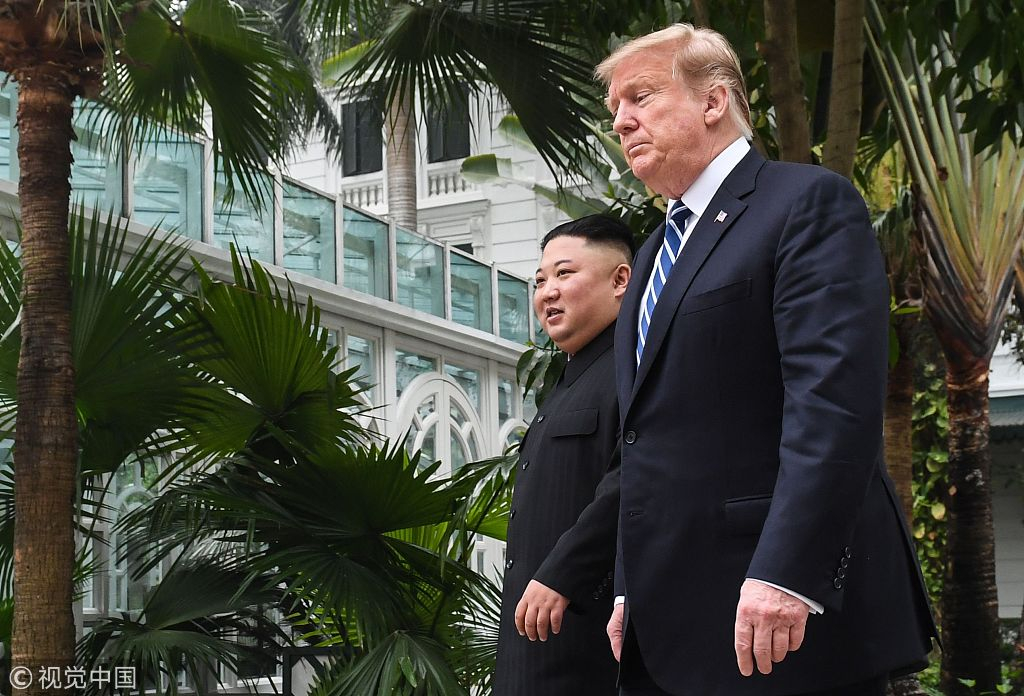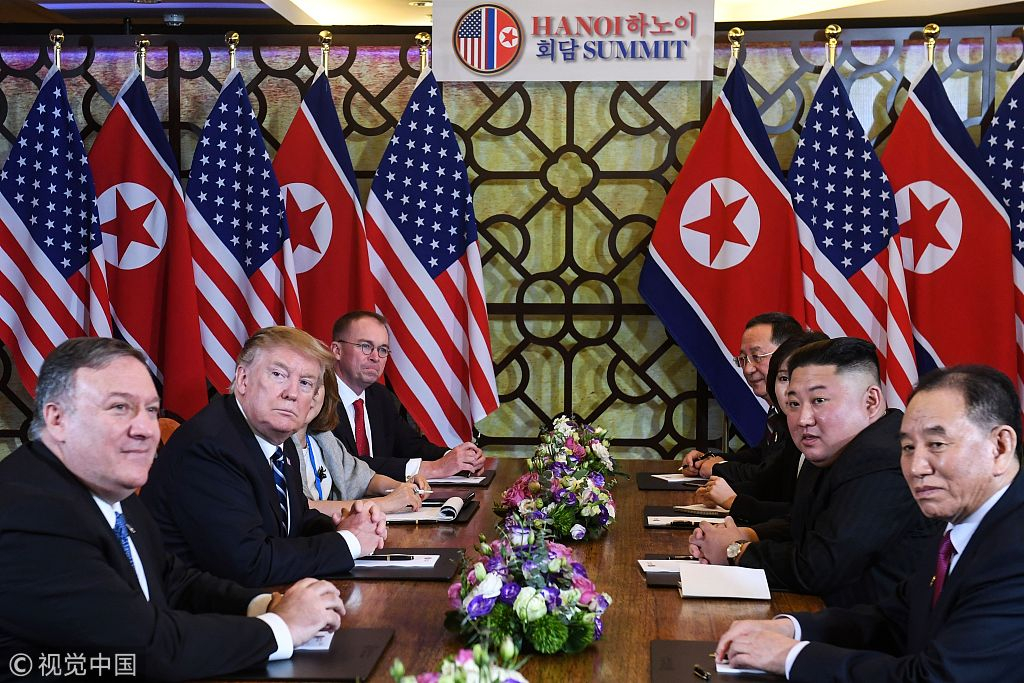
Opinion
21:03, 03-Mar-2019
China to enhance mutual trust between DPRK and U.S.
Wang Peng

Editor's note: Wang Peng is an associate research fellow at the Chongyang Institute for Financial Studies, Renmin University of China. The article reflects the author's opinion, and not necessarily the views of CGTN.
The 2019 DPRK-U.S. Hanoi Summit was a decisive two-day meeting between DPRK Chairman Kim Jong Un and U.S. President Donald Trump. Media around the world had great anticipation that the two equally strong leaders may find a final solution and practical guideline for the chronic security tensions between the two nations.
However, those hopes were dashed once again.
On February 27, Trump spent the Wednesday in Vietnam cozying up to Kim over grilled sirloin and chocolate lava cake, in order to reach for the legacy “great dealmaker negotiating a historic nuclear arm accord” as Trump had always dreamed.
Now that dream has collapsed after his summit breakdown with Kim, along with a potential Nobel Peace Prize.

U.S. President Donald Trump leaves after a press conference following the second U.S.-DPRK Summit in Hanoi, February 28, 2019. /VCG Photo
U.S. President Donald Trump leaves after a press conference following the second U.S.-DPRK Summit in Hanoi, February 28, 2019. /VCG Photo
While the DPRK leader Kim Jong Un spent his last day in Hanoi on March 2, laying large red-and-yellow wreaths at a war memorial and at the mausoleum of national hero Ho Chi Minh as he continued an official state visit.
On February 28, 2019, the White House announced that the Summit was cut short and that no agreement was reached, with Trump later elaborating that it was because DPRK wanted “an end to all sanctions.”
By contrast, the DPRK Foreign Minister Ri Yong-ho asserted that the country only sought “a partial lifting of 5 United Nations sanctions placed on Pyongyang during 2016 and 2017.”
Since there were only a few authorized witnesses acknowledging the true details of Trump and Kim's talk, now the contradictory targets of the DPRK and U.S. have become a “Rashomon,” a classic Japanese film, in which four parties have seen the same events, but when telling it later, they have four different stories of what “really” happened.
What is strategically more important than the truth about the discourse of either the DPRK or the U.S. is the unique fact behind their contending diplomatic parlance.

U.S. President Donald Trump (R) walks with DPRK's leader Kim Jong Un during a break in talks at the second U.S.-DPRK Summit in Hanoi, February 28, 2019. /VCG Photo
U.S. President Donald Trump (R) walks with DPRK's leader Kim Jong Un during a break in talks at the second U.S.-DPRK Summit in Hanoi, February 28, 2019. /VCG Photo
Fact I: The two parties really want far more than the amount that the opposite side can offer, or the original plan that the diplomats of two countries arranged before the Summit.
For the U.S., the DPRK must take the first step by denuclearizing all its nuclear weapons, facilities, raw materials, and the design-production team; and then Washington may consider the establishment of U.S.-DPRK diplomatic ties and bringing a peace agreement on the Korean Peninsula.
For the DPRK, unfortunately, they think exactly in the same way. Both sides insist that the other one must take the risk and make concessions first. The deep reason is the lack of mutual trust.
Fact II: Mutual trust is the rigid demand for further negotiations between the DPRK and the U.S. However, neither side can make up the gap.
Therefore, a responsible third party is in urgent need, which may play the role as mediator and guarantor. The third party can be trusted by the DPRK and the U.S., and works to ensure promises from both sides.

U.S. President Donald Trump (2nd L) and DPRK leader Kim Jong Un (2nd R) hold a bilateral meeting during the second U.S.-DPRK Summit in Hanoi, February 28, 2019. /VCG Photo
U.S. President Donald Trump (2nd L) and DPRK leader Kim Jong Un (2nd R) hold a bilateral meeting during the second U.S.-DPRK Summit in Hanoi, February 28, 2019. /VCG Photo
This idea is indeed not new. International observers and experts have made various proposals during the past years. However, it seemed that neither the U.S. nor the DPRK has fully understood the value of the intermediary. Apparently, they were both eager to enjoy direct face-to-face dialogue.
Now, the lessons from Hanoi may remind the two leaders: the boundary of their power, the lack and rigid demand of mutual trust, as well as the role and value of a responsible third party.
Just on the same day of the Summit ending, DPRK's Vice Minister of Foreign Affairs Ri Kil Song visited China. At the invitation of the Chinese Foreign Ministry, Ri Kil Song intended to discuss bilateral relations and issues of common interest.
This is a good beginning, and the world may look forward to witnessing a further and more productive negotiation between the DPRK and the U.S. some days later with necessary assistance from a responsible third party.
(If you want to contribute and have specific expertise, contact us at opinions@cgtn.com.)

SITEMAP
Copyright © 2018 CGTN. Beijing ICP prepared NO.16065310-3
Copyright © 2018 CGTN. Beijing ICP prepared NO.16065310-3